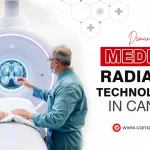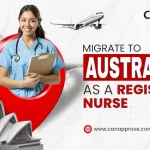The healthcare sector is facing a severe workforce shortage, partly due to Canada’s low birth rates and aging population. Recent job vacancy data from Statistics Canada indicates that there were 144,500 vacant in Healthcare Occupations and social assistance sector as of March 2023, accounting for 17.7% of all unfilled positions.
Various provinces and territories have implemented targeted streams within their Provincial Nominee Program (PNP) to address the workforce deficit and attract foreign-trained healthcare professionals. For instance, Alberta introduced the Designated Healthcare Pathway as part of the Alberta Advantage Immigration Program, while British Columbia and Ontario regularly invite healthcare professionals to their PNP draws. 
This opens up new opportunities for healthcare professionals to immigrate to Canada.
Let’s explore all the eligible healthcare occupations under the new Healthcare occupations category (2023-1) here.
Understanding Canada Express Entry System
The Canada Express Entry system is an immigration management program introduced by the Canadian government in January 2015. The system aims to attract highly skilled and qualified individuals who can contribute to Canada’s economy and workforce and offer permanent residency.
The Express Entry system is a points-based system, and the Comprehensive Ranking System (CRS) scores required for Invitation To Apply (ITA) can change with each fortnightly draw depending on the number of candidates in the pool and the specific immigration targets of the Canadian government.
New Category-Based Express Entry Draws
The latest innovation in the system includes the announcement of category-based draws where candidates in specific occupations will now be targeted for PR, including
1. Healthcare
2. Science, Technology, Engineering, and Mathematics (STEM) professions
3. Skilled trades, such as carpenters, plumbers, and contractors
4. Transport
5. Agriculture and agri-food
Eligible candidates must fulfill the following requirements:
1. Continuous work experience of a minimum of six months within the last 3 years in an eligible occupation category.
2. This experience can be gained either in Canada or abroad.
Click here to listen to Ms. Teena who got her Canada PR under the occupation-specific Express Entry stream.
30+ Eligible Healthcare Occupations
A. Registered Nurses (RN) and Nurse Practitioners (NP)

| Registered Nurses (RN) | Nurse Practitioners (NP) |
| They are essential members of the healthcare team in Canada.
Educational Requirements: Candidates must complete a recognized nursing program, typically including a Bachelor of Science in Nursing (BSN) degree, although diploma programs are also accepted in some provinces. Licensure: After completing the educational program, graduates must pass the National Council Licensure Examination for Registered Nurses (NCLEX-RN) to obtain their nursing license. Each province and territory in Canada has its nursing regulatory body responsible for issuing licenses. |
They are advanced practice nurses with a more extensive scope of responsibilities.
Educational Requirements: Most NPs hold a Master of Science in Nursing (MSN) or a Doctor of Nursing Practice (DNP) degree with a focus on a specialized area of practice. Certification: NPs need to obtain certification from a recognized nursing certification organization, such as the Canadian Nurses Association (CNA) or the Canadian Nurse Practitioner Examination: Family/All Ages (CNPE: F/AA) exam. Licensure: Like RNs, NPs must be licensed by the nursing regulatory body in the province or territory where they plan to practice. |
B. Physicians and Specialists

| Ontario | Ontario has a high demand for medical practitioners, particularly in urban centers like Toronto and Ottawa. |
| British Columbia | British Columbia seeks to attract physicians and specialists, especially in rural and remote areas, to address healthcare access issues. |
| Alberta | Alberta’s rapidly growing economy and population, particularly in major cities like Calgary and Edmonton, focuses on recruiting specialists in fields such as cardiology, oncology, and neurology. |
| Quebec | Quebec has a demand for medical practitioners, especially those proficient in French. There is a need for physicians and specialists in both urban centers like Montreal and rural regions. |
| Atlantic Province | The Atlantic provinces, including Nova Scotia, New Brunswick, Prince Edward Island, Newfoundland and Labrador, often face challenges in recruiting and retaining medical practitioners, particularly in rural and remote areas. |
It’s important to note that the licensure process may vary slightly between provinces, and candidates should check with the specific medical regulatory authority in their intended province for the most up-to-date requirements.
Canada has made it easier for self-employed Physicians in Canada to qualify for permanent residency through Express Entry. Eligible candidates can qualify under Canada Experience Class (CEC) to apply for permanent residency through Express Entry.
C. Pharmacists

1. Pharmacy Examining Board of Canada Evaluating Examination (PEBC EE): After completing the Education Credential Assessment (ECA) and meeting language requirements, pharmacists must pass the PEBC Evaluating Examination. This exam assesses their knowledge of pharmacy practice and Canadian healthcare regulations.
2. Pharmacist’s Gateway Canada: Pharmacists can create an account on Pharmacist’s Gateway Canada, an online portal that guides applicants through the licensure process, connects them with regulatory authorities, and provides essential resources.
3. Structured Practical Training (SPT): Depending on the province, international pharmacists may need to complete a period of structured practical training under the supervision of a licensed pharmacist in Canada.
4. Pharmacy Examining Board of Canada Qualifying Examination (PEBC QE): The final step is passing the PEBC Qualifying Examination, which assesses clinical skills and competency in pharmacy practice.
5. Licensure: After successfully completing all the necessary exams and practical training, pharmacists can apply for licensure with the provincial regulatory authority where they intend to practice.
Other Eligible Healthcare Occupations
All the invited profiles in the latest category-based Express Entry draws also had prior work experience in any one of the following 35 healthcare occupations:
- Audiologists and speech-language pathologists
- Chiropractors
- Dentists
- Dieticians and nutritionists
- Education counselors
- General practitioners and family physicians
- Instructors of persons with disabilities
- Kinesiologists and other professional occupations in therapy and assessment
- Licensed practical nurses
- Massage therapists
- Medical laboratory assistants and related technical occupations
- Medical laboratory technologists
- Medical radiation technologists
- Medical sonographers
- Nurse aides, orderlies, and patient service associates
- Nurse practitioners
- Nursing coordinators and supervisors
- Occupational therapists
- Optometrists
- Other assisting occupations in support of health services
- Other practitioners of natural healing
- Other professional occupations in health diagnosing and treating
- Other technical occupations in therapy and assessment
- Paramedical occupations
- Pharmacy technical assistants and pharmacy assistants
- Physician assistants, midwives, and allied health professionals
- Physiotherapists
- Psychologists
- Registered nurses and registered psychiatric nurses
- Respiratory therapists, clinical perfusionists, and cardiopulmonary technologists
- Specialists in clinical and laboratory medicine
- Specialists in surgery
- Therapists in counseling and related specialized therapies
- Traditional Chinese medicine practitioners and acupuncturists
- Veterinarians
Also, read>> New Brunswick Takes Steps to Address Nursing Shortage, Plans To Cover Costs for IENs
Language Proficiency and Express Entry
Under the Express Entry system in Canada, language proficiency (Listening, Reading, Writing, and Speaking) is a crucial factor for healthcare professionals, as it contributes significantly to the Comprehensive Ranking System (CRS) score.
The two official languages of Canada are English and French. Candidates are required to demonstrate language proficiency in either English or French, and they can submit test results from approved language testing agencies – International English Language Testing System (IELTS), the Canadian English Language Proficiency Index Program (CELPIP), Test d’évaluation de français (TEF).
Language proficiency is a significant factor not only in Express Entry but also for healthcare professionals seeking licensure and employment in Canada. Many provincial regulatory bodies and employers require proof of language proficiency as part of the licensing and hiring process.
Demonstrating strong language skills can enhance the chances of successful immigration and integration into the Canadian healthcare workforce.
Register Your Express Entry Profile

1. Submit an Expression of Interest (EOI) online
2. Profile assessment on Comprehensive Ranking System (CRS)
3. Receive an Invitation to Apply (ITA)
4. Apply for Permanent Residence (usually within 60 days)
5. Get Permanent Residence Status
Having a licensed consultant like CanApprove will simplify the entire process from start to end. If you’re a working healthcare professional and planning for your immigration in search of better work opportunities, you should consider Canada.
Visit CanApprove and claim your free appointment today. We are available in major centers across India, UAE, and Qatar.













Jaspreet Kaur says:
I’m Registered Nurse and my visa is valid till January 2024. Can you please tell me PR options
siva says:
Dear Jaspreet,
We are happy to help you. Please share your updated Resume to enquiry@canapprove.com or talk to our immigration coordinator through whatsapp.
Jass says:
Does working in walmart pharmacy as pharmacy assistant counts for healthcare express entry draws as well?
Post Commenter says:
Hello Jass,
While the specific requirements for healthcare-related occupations in Express Entry can vary, pharmacy assistants are generally considered to be in a healthcare field. Your experience in a pharmacy setting, even if not as a fully licensed pharmacist, can contribute to your eligibility for Express Entry.
It’s important to note that the Canadian government periodically updates its list of eligible occupations for Express Entry. To ensure your specific role qualifies, you should check the most recent list or consult with an immigration professional like CanApprove.
John says:
I’ve noticed pharmacists aren’t always included in the Healthcare occupations draw? Why is that so?
Also, How possible is it for a pharmacist to apply for PNP?
Post Commenter says:
Hi John,
Pharmacists may not always be included in healthcare-specific draws because each draw targets specific occupations based on labor market needs and shortages at that time. If there’s a sufficient supply of pharmacists or the focus is on other critical healthcare roles, pharmacists may not be prioritized in certain draws.
It’s possible for pharmacists to apply for Provincial Nominee Programs (PNP), especially in provinces where there’s a demand for healthcare professionals. Each province has its own criteria and may prioritize pharmacists in their specific streams if there’s a regional need. Research the PNP requirements for the province you’re interested in to determine eligibility. For more details Book a consultation with our experts.